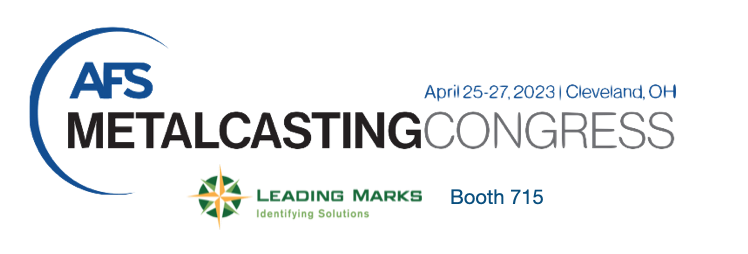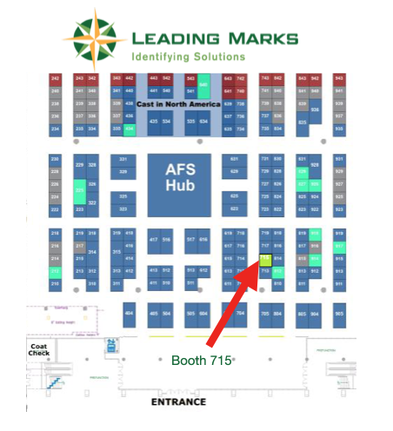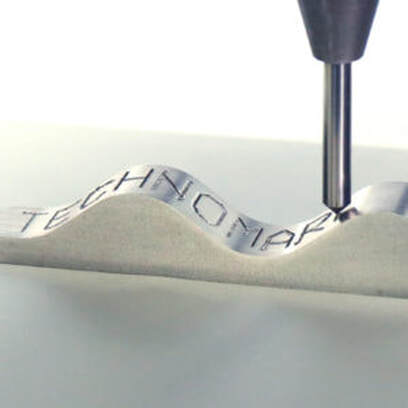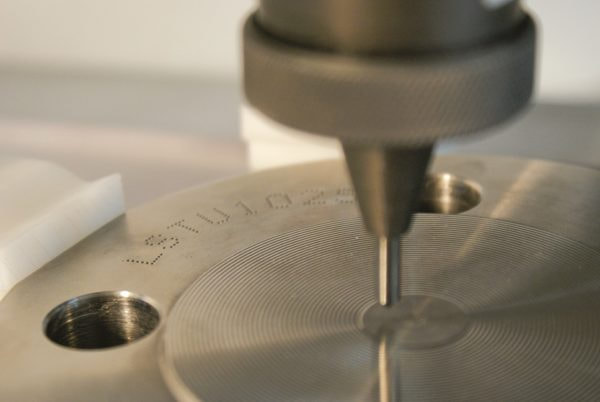|
Metalcasting Congress returns to the Huntington Convention Center in Ohio on April 25-27, 2023 – and you can visit Leading Marks in Booth 715! The Metalcasting Congress attracts attendees from across the foundry industry, as well as professionals from other businesses within the manufacturing supply chain. Nestled along Lake Erie’s southern shore, Cleveland is the second largest city in Ohio. Huntington Convention Center of Cleveland is hosting Metalcasting Congress 2023, providing over 410,000 square feet of prime meeting and event space. The convention center is also just 25 minutes away from Cleveland Hopkins International Airport. Leading Marks & Boss Buddy |
| We will also be showcasing secondary marking requirements with direct-part marking systems and tools such as dot peen, laser & stamps, ink marking, hand-held & automated systems, and thermal transfer labeling solutions. We will also be discussing workbenches, air filtration, vision handheld scanners and in-line options, soldering irons, and machining accessories. Huntington Convention Center Cleveland, OH April 25 – 27, 2023 Leading Marks Booth 715 |
| And while several different types of part-marking exist, Dot Peen marking machines have been a preferred solution for many years. At a high level, Dot Peen marking machines use either electromagnetic or pneumatic force to rapidly oscillate a stylus, in turn indenting the marks onto the surface of the part. One of the advantages of Dot Peen is that it’s very flexible and can be used in either manual or fully automated production lines. A lot of the applications Dot Peen serves are manual applications, however, with modular Dot Peen systems, you can start with a portable system and later convert it to an in-line system for integration with fully automated production lines |
The Basics of Dot Peen Marking
The Dot peen process is considered a “low-stress” marking method because the mark is generated via material displacement rather than material removal. The carbide stylus strikes the material surface to produce the mark via a series of cold-formed stamped dots. Compared to Laser Marking Systems, Dot Peen does not induce thermal shock to the part surface since the material is cold-stamped rather than super-heated to produce the mark.
Dot Peen systems are commonly used by manufacturers in the aerospace and oil & gas industries where low-stress marking is required, such as tubular and flow control products that are exposed to extreme pressure differential in the oilfield.
Dot Peen marking is viable for material hardness up to 63 HRC. Typically, when a part hardness is greater than 63 HRC, laser marking systems are recommended.
All of Technomark’s Dot Peen machines rely on an electromagnetic solenoid to actuate the marking stylus. Dots are plotted in an X/Y plane via electronic control for precise placement of the Dot pattern. Using electromagnetic force versus pneumatic also provides a greater level of control of both the depth of the mark as well as the ability to mark contoured or complex surface.
Dot Peen Marking: Component Traceability In Action
- Automotive
- Oil and Gas (pipes, fittings valves, other)
- Aerospace
- Defense
- Metalworking (general purpose)
| The best Dot Peen marking machines utilize a fully electric design and that doesn’t require compressed air to operate. All Technomark Dot Peen marking machines feature an Intelligent Driving Impact (IDI) function that allows for marking on many different materials and finishes. The IDI function automatically adjusts and levels the stylus to the workpiece. |
When structural integrity is crucial, Dot Peen marking provides a low-stress marking solution that removes no material when marking the part.
Why Choose Dot Peen Marking
- Portability: battery-operated systems are ergonomic and perfect for smaller-scale operations or marking of large, heavy parts that cannot be transported to a fixed location for marking
- Versatility: state-of-the-art Dot Peen marking systems are modular and can start with a portable or manual marking system that can later be adapted to a fully automated production line
- Ease of use: Dot Peen machines are easy to program and do not require any advanced computing knowledge or technical training.
- Permanency: Dot Peen marking process yields a permanent, indelible mark that can withstand harsh operating environments
- Economical: Compared to other marking systems, Dot Peen systems are typically less than $10,000.
- Wireless connectivity between marking head and control (Network-able devices that are able to communicate to other devices through wireless communications)
- On-board diagnostic tools to help the operator know when it’s time for scheduled maintenance — protecting your investment.
AuthorS
There are variety of authors who write the articles including marking manufacturers. You'll find a lot of technical imformation, application stories and new product releases here. Be sure and click a category below that interests you to search it.
Archives
May 2024
April 2024
March 2024
February 2024
January 2024
December 2023
November 2023
October 2023
September 2023
August 2023
July 2023
June 2023
May 2023
April 2023
March 2023
February 2023
January 2023
November 2022
October 2022
September 2022
August 2022
July 2022
May 2022
March 2022
December 2021
November 2021
September 2021
August 2021
July 2021
May 2021
March 2021
February 2021
January 2021
December 2020
July 2020
June 2020
May 2020
April 2020
March 2020
February 2020
January 2020
December 2019
November 2019
October 2019
September 2019
August 2019
July 2019
June 2019
April 2019
March 2019
January 2019
December 2018
November 2018
October 2018
September 2018
August 2018
July 2018
June 2018
May 2018
April 2018
March 2018
February 2018
January 2018
December 2017
October 2017
September 2017
July 2017
June 2017
May 2017
April 2017
December 2016
September 2016
August 2016
July 2016
June 2016
May 2016
April 2016
February 2016
January 2016
August 2015
October 2014
July 2010
Categories
All
AFS Medtalcasting Congress
AFS Pittsburgh
Area Tool
Arromark
Automator
Benson Foundry
Bepop
BizMix
Boss Buddy
Bots IQ
Case Study
Cembre
Clamping
Covid
Date Codes
Design 2 Part
Direct Part Marking (DPM)
Dot Peen
Durable Mecco
EBS Ink Jet
Embossing Dies
Flexpak
Foundry Society
Foundry Solutions
Fundamentals
Gravotech
Handjet
Handstamp
Hexacon
HFO Demo Day
Honeywell
Hot Stamping
IMTS
ITT Gould Pumps
JetStamp
Labeling
Laser Marking
Laurie Barcaskey
Leading Marks
LEDLenser
Manufacturing Expo
Marking
Marking Indsutry Magazine
Max USA
Mfg Advanced Expo
MFG Day
Mitee Bite
Modern Casting
Modern Machine Shop
Nameplates
NTMA
OSHA Compliance
Pitt Chem Day
Presentations
Promotions
Reiner
Reiner Jetstamp 1025
Rising Rust Belt
Roll Dies
Scanners
SDS & MSDS
Signage
Stamping Press
Steel Stamps
Supply Chain
Tags
Tapmatic
Tapmatic MH Marking Head
TBH
TBH BF -Series
TBH GL-Series
Tech Article
Technifor
Technomark
Testimonials
Thermal Printing
Traceability
Trade Shows
Unique Device Identification (UDI)
Videos
WBENC - Women’s Business Enterprise National Council
WBE Women’s Business Enterprise
WBE - Women’s Business Enterprise
Workholding
WOSB - Women Owned Small Business
Zuess Marking






 RSS Feed
RSS Feed
